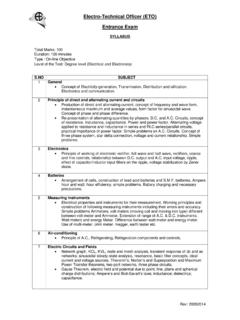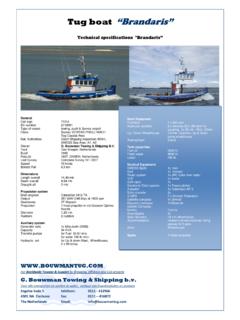Transcription of Functions to be performed by ship’s officers
1 MANNING OF SHIPS It is well known and accepted that from times immemorial, maximum quantity of goods (cargoes) have been transported and are still transported by ships across the seas. In the past, sailing ships were the only means of sea transport, which were primarily meant for exchanging goods between countries, for profit. Gradually the need for this transport increased because the people living in one part of the world needed certain goods for their very existence like coal, oil, food, textile, construction material, etc. which were in abundant supply in another part of the world.
2 Gradually the sailing ships gave way to self propelled mechanized ships. In fact today these ships have become the most important ingredient in the well-being of the human population. Some eminent persons have highlighted this aspect by saying that if ships stop operating, half the world will die of hunger and the other half will freeze to death. Ships cannot run on fuel, fresh air and sophisticated equipment only. These have to be operated by sufficient number of adequately trained. Qualified and experienced seafarers so that the ships can cross the oceans safely, and the cargo placed in their care is delivered to its destination, in as good a condition as it was received.
3 Functions to be performed by ship s officers In order to achieve this objective, International Maritime Organisation (IMO) has created the Convention on Standards of Training, Certification and Watch keeping for Seafarers (STCW) which prescribes that the ship shall be manned by qualified seafarers to carry out the following Functions to the best of their ability; 1. Navigation means taking the ship from one place to the other well clear of all dangers. 2. Cargo handling and stowage means looking after the cargo from the time it is loaded in the ship till it is finally unloaded at the destination.
4 3. Controlling the operation of the ship and care for persons on hoard means ensuring that the ship is operated in a safe manner throughout the voyage. Without causing any damage to the environment and the seafarers on board remain safe and healthy at all times. 4. Marine engineering means maintaining and operating the ship s machinery, whether on deck or in engine room, in efficient manner. 5. Electrical, electronic and control engineering means operating the ship s electronic and electrical equipment, including control systems, in an efficient manner. 6. Maintenance and repair means looking after the ship s structure, fittings, equipment and machinery so that the ship as a whole will perform without any hitch.
5 7. Radio Communication means ensuring that continuous communication is available between the ships at sea and with the shore organizations for safety of ship, life and environment. Navigating officers are trained, qualified and certificated to be competent to perform the Functions 1, 2, 3 and 7, while the engineering officers shall he competent to perform the Functions , 5 and 6. Few ratings are trained and nominated to support the officers in performing the above Functions . Minimum Safe Manning Document In order to ensure that every ship is manned by adequate number of seafarers who are competent and capable of carrying out the above Functions , IMO has prescribed in Regulation 14 of Chapter V of the Safety of Life at Sea (SOLAS) Convention as follows: Each State shall adopt measures to ensure that, from the point of view of safety of life at sea, all its ships are sufficiently and efficiently manned.
6 All ships engaged on international voyages shall carry a Sate Manning Document issued by the Flag State (The State where the ship is registered) Principles of Safe Manning In order to help the states to issue proper safe manning document to their ships, IMO has prescribed the principles for deciding the precise minimum safe manning of different ships, by its Resolution No. (21) which was subsequently amended by another resolution No. (23). These principles are follows: Maintain safe navigational engineering and radio watches. This means that certain number of qualified seafarers should be on duty on the deck, on the bridge and in the engine-room, round the clock, whether the ship is at sea or in port.
7 The qualifications of these seafarers have been prescribed in another convention of IMO, namely standards of Training, Certification and Watch keeping for Seafarers (STCW). Maintain general surveillance of the ship. This means that some persons have to be nominated to take regular rounds of the ship throughout the voyage, and thus ensure that no untoward incident is likely to take place which may harm the ship, cargo or persons. Safely moor and unmoor the ship. This means that some persons have to be nominated to take regular rounds of the ship throughout the voyage, and thus ensure that no untowards incident is likely to take place which may harm the ship, cargo or persons.
8 Manage safely Functions of the ship when employed in stationary or near-stationary mode at sea. Safety of ship and life at sea is of paramount importance and this function applies to practically every seafarer on board. Perform operations to prevent damage to the marine environment. Everyone nowadays is highly conscious of protecting the marine environment. Hence responsible seafarers on hoard should operate the ship in environment friendly manners. Maintain safety arrangements and cleanliness of all spaces to minimize the risk of fire. Prevention is better than cure.
9 Hence responsible seafarers on board have to take steps to minimize or eliminate the chances of occurrence of fire. Also they should maintain necessary equipment to extinguish the fire should it occur. Provide medical care on board ship. Ships do not carry a qualified doctor because there are very few persons on board. Hence it becomes necessary that certain seafarers are adequately trained to tackle medical emergencies till appropriate medical help is available from shore. Ensure safety of cargo during transit. Cargo has a high commercial value and importance for the ship owner because that is what brings in his revenue.
10 Hence a ship should have adequately trained and qualified seafarers o take care of the cargo when it is finally unloaded. Inspect and maintain structural integrity of the ship. If a ship has to perform voyages across the seas throughout its life time, in all kinds of weather conditions, then it is essential that seafarers on board should be able to periodically inspect and maintain its strength, and thus protect their own safety. Operate in accordance with the ship s security plan. Ensuring security of the ship and thus protecting the lives of seafarers on board has become an essential duty and requirement in today s world.








